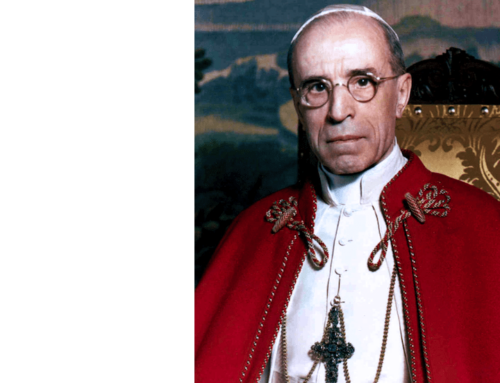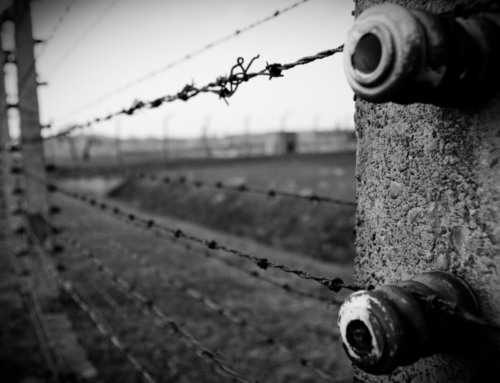|
By Sister Margherita Marchione, Ph.D. (From Catalyst, November 2003) The following article, written by Sister Margherita Marchione, discusses new evidence from the Vatican Archives that shows the heroism of Pope Pius XII. Sister Margherita is no stranger to Catholic League members: we have published many of her articles on Pius XII. And she is certainly no stranger to the subject, having authored several books on Pius. Here, then, is her latest contribution. Pius XII was not “silent,” and his courageous acts during World War II are incontestable. When Vatican Archives were opened in February 2003 for the period 1922-1939, the media expected to find documents supporting the claim that Pope Pius XII did not do all he should have done to save the victims of the Holocaust. On the contrary, the new material confirms that Pius XII was indeed a champion for peace, freedom, human dignity; a pastor who encouraged Catholics to look on Christians and Jews as their brothers and sisters in Christ, all children of a common Father. The opening of the Vatican Archives has already proven that accusations against Pius XI and Pius XII are baseless. A letter dated November 14, 1923, to Vatican Secretary of State Cardinal Pietro Gasparri written by Eugenio Pacelli (later Pius XII) when he was Nuncio in Bavaria, refers to Adolf Hitler’s failed attempt to take over the local government of Munich. He denounces the National Socialist movement as an anti-Catholic threat and notes that the cardinal of Munich had already condemned acts of persecution against Bavaria’s Jews. Documents reveal that in 1933, as Secretary of State, Pacelli reviewed Nuncio Cesare Orsenigo’s New Year’s discourse and by secret code told him to remove the words “Leader of the German people” and to eliminate a paragraph that praised Hitler. In 1936, when invited by Hilter to attend the Nazi Congress, the nuncio again sought advice. So that he would not be obliged to attend, Pacelli suggested that he take a vacation so that he could absent himself. Pacelli corrected the nuncio’s communications and told him not to participate with the Diplomatic Corps. Other corrections prove that Pacelli was not sympathetic toward Hitler whom he considered possessed by the devil and even attempted to exorcize him. Historians and archivists confirm the authenticity of this document which demonstrates that, early on, the Vatican protested on behalf of Jews in Nazi Germany. It confirms the testimony of Father Robert Leiber who, in 1962, wrote an article on Pius XI’s papal encyclical of 1937, Mit Brennender Sorge, which appeared in the German periodical Stimmen der Zeit. Leiber wrote: “It is significant that the first initiative of the Holy See toward the government in Berlin concerned the Jews. As early as April 4, 1933, ten days after the Enabling Act, the Apostolic Nuncio in Berlin was ordered to intervene with the government of the Reich on behalf of the Jews and to point out all the dangers involved in an anti-Semitic policy.” The Catholic Church, therefore, did not simply protest on behalf of Church interests during negotiations of the Concordat, but protested on behalf of persecuted Jews when the new Hitler regime announced a major boycott of Jewish businesses. During World War II and the horrors of the Holocaust, millions of Jews and other Europeans suffered and were killed by the Nazis. In 1943, the Eternal City was occupied by the Nazis and bombed by the Allies during a two-hour attack. The Holy Father hurried from the Vatican to the streets of Rome. He stood in the midst of the terrorized people as buildings collapsed in piles of smoldering rubble, and bombs exploded on all sides. The Romans ran toward him for guidance and strength. With hands and cassock smeared with the blood of the dead and the wounded, he blessed and consoled them, and took care of their immediate needs. While Pius XII joined his flock, civil authorities fled. The people acclaimed him, “Defensor Civitatis.” Pius XII operated a vast underground railroad. Although horrible to recall, it is important that the lessons of the Holocaust be retold accurately, and to recognize those who helped the persecuted. In occupied Europe, the Nazis killed 67 percent of the Jews. Millions of Christians did not escape Nazi terror during Hitler’s attempt to exterminate all Jews. While Italy was being devastated by Allied bombs, the Nazis were killing innocent people. Eighty-five percent of Italian Jews were saved. Throughout Europe, sixty-five percent of the Jews were exterminated. There is an abundance of evidence testifying to Pius XII’s courage and integrity, as well as to his efforts to prevent the war and to shelter countless victims, including Jews. This generation should be talking about the debt of gratitude it owes Pope Pius XII, not maligning him. It is crucial that any judgment of Pius XII look closely at the broadcasts of Vatican Radio. It has enjoyed a long history of world recognition and credibility, supporting both the sacred and secular objectives of the Church throughout the religious and political turmoil. It has been the daily “voice” of the Pontiffs—a bridge uniting Shepherd with his flock. It not only broadcasts the teachings of the Roman Pontiff, but it also gives information on the activities of the Holy See, reports on Catholic life throughout the world, and indicates the Church’s point of view on current issues and her readiness to respond to the signs of the times. Vatican Radio announces the Christian message freely and efficiently and links the center of Catholicism with the different countries of the world. The wartime organization, The Sword of the Spirit, led by Cardinal Hinsley of Great Britain, was inspired by Pope Pius XII and approved by the Vatican. This group published a monthly bulletin which tried to bring together Catholics, Protestants and Jews. Topics included freedom, education, social and economic problems. With monograms by Christopher Dawson, John Murray, SJ, Barbara Ward and other well-known writers, the group published a series of leaflets on wartime activities. These offer proof of Pope Pius XII’s embrace of all peoples and faiths. Among the pamphlets of this ecumenical organization, one title is: “Voice of the Vatican” by Robert Speaight. In it the author answers the question, “What is the Pope’s attitude towards the belligerent nations and the issues for which they are fighting?” He analyzes the policy of Vatican Radio and shows how uncompromisingly it spoke on the moral and spiritual problems raised by the war. In “The Pope and the Jews,” A.C.F. Beales describes the struggle of the Catholic Church against anti-Semitism during the war. Certainly, such contemporary commentaries deserve to be carefully considered. Documents reveal that Jan Hermann and Dr. Max Pereles, from the Ferramonti-Tarsia concentration camp, went to the Vatican on October 29, 1944, to thank Pope Pius XII. They gave him a letter which read in part: “While our brothers were hunted, imprisoned and threatened with death in almost every country in Europe, because they belonged to the Jewish people, Your Holiness …fearlessly raised his universally respected voice, in the face of our powerful enemies, in order to defend openly our rights to the dignity of man. ….When we were threatened with deportation to Poland, in 1942, Your Holiness extended a fatherly hand to protect us, and stopped the transfer of Jews interned in Italy, thereby saving us from almost certain death.” Shortly after the Pope’s death, Secretary of State Cardinal Domenico Tardini wrote in his book Pio XII: “Pius XII will go down in history as a Pontiff who was a wise reformer and brave innovator. He was a voice of truth, of justice, of love. Pius XII was a holy person, a symbol of mercy and of hope during a period of lies, despair and hatred. Everyone appreciated his intelligence and his extraordinary capacity to comprehend the dangers of Nazism and his efforts to alleviate the sufferings of humanity. His messages attempted to unite the world. His contemporaries listened to his inspiring words, as he spoke of brotherhood, of love, and of peace at a time of spiritual poverty and material destruction of exceptional dimensions.” Pius XII was engaged in the greatest Christian rescue program in the history of the Church. Editorials of the time attest to the fact that he saved hundreds of thousands of Jews and Christians from death in the concentration camps and served as a beacon of hope throughout his pontificate. We join his contemporaries and express our gratitude. My new book, Man of Peace: Pope Pius XII (Paulist Press), summarizes the issues. Another book, Pope Pius XII, published in Milan, Italy (Ancora Press), reveals his saintly and virtuous life; his scholarship and peace-making efforts; his commitment as the defender and protector of the victims of war and hatred which drenched Europe in blood during World War II. Pope Pius XII was a moral beacon to mankind. He resisted the clamor to accommodate the Catholic Church to the world. His voice was heard around the world during the twenty years of his pontificate. It was the “Voice” of a tireless world leader whose contribution to humanity during the Holocaust is incontrovertible. Man of Peace: Pope Pius XII was published in January 2004. For information on how to order it and Sr. Margherita’s other books, including Consensus & Controversy: Defending Pope Pius XII, contact Paulist Press: 1-800-218-1903. |
| Copyright © 1997-2011 by Catholic League for Religious and Civil Rights. *Material from this website may be reprinted and disseminated with accompanying attribution. |



